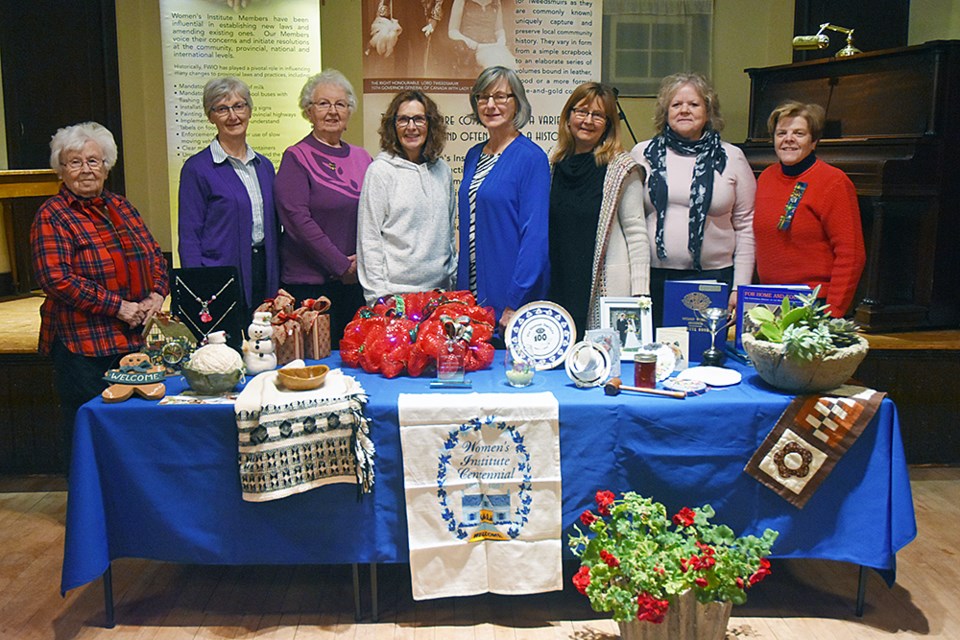The members of the Tec-We-Gwill Women’s Institute are celebrating two anniversaries this year.
It's the 73rd anniversary of their own branch, founded in 1949 by a group of young wives of local junior farmers.
2020 also marks the 123rd Anniversary of Women’s Institute itself, an organization for “family, home, community and country,” founded by Adelaide Hunter Hoodless on Feb. 19, 1897.
It’s a uniquely Canadian story, a story of achievement and success that grew out of tragedy.
Adelaide Hunter was born in 1857, and raised on a farm in Canada West (Upper Canada). She later attended a Ladies’ College in Brantford, Ontario, where she met and married John Hoodless.
She didn’t step into the spotlight until after personal tragedy. Hoodless lost her fourth child, John Harold, when he was only 14 months old – likely the result of drinking milk contaminated with the bacteria, Listeria.
It left Hoodless convinced that there was a need for more education, advocacy and public hygiene – that Canadian farm wives needed the tools and training to care for their families. She dedicated herself to domestic science education, writing “The Little Red Book,” a textbook for Domestic Science courses, that focused on hygiene, cleanliness and thrift.
She was invited to bring her message to a ‘Ladies Night’ meeting in Stoney Creek, Ontario, in 1897, at the invitation of Erland Lee. The meeting proved to be life-changing.
Hoodless proposed forming a women’s group, that would not only help educate rural women on agricultural and domestic hygiene issues, but also provide social opportunities for often-isolated farm wives.
She returned a week later, on Feb. 19, for the first meeting of the “Women’s Institute” – and found more than 100 women waiting for her. The first Women’s Institute was launched with 75 members.
By 1900, there were 33 branches of Women’s Institute in Ontario, with over 1,600 members.
Just four years later, there were 149 branches with more than 5,400 members.
Hoodless died in 1910 of a cerebral hemorrhage, at the age of only 53. She never got to see the formation of the Federated Women’s Institutes of Ontario, and Federated Women’s Institutes of Canada, in 1919 – or the development of Women’s Institutes as a world-wide movement, through the Associated Country Women of the World (ACWW), an organization dedicated to the promotion of education, nutrition, health and wellness, sanitation, sustainable agriculture, and income programs for women.
The ACWW now has nine million members in 469 societies, active in 80 countries.
Women’s Institute continues to thrive in Ontario – including the Tec-We-Gwill Women’s Institute, which meets regularly in the hall in Newton Robinson, in Bradford West Gwillimbury.
Back in 1949, five farm wives – Marguerite Ramsay, Gladys (Houghton) Bell, Ruth (Noble) Milligan, Emlyn Westlake and Ella Langford – founded the Tec We Gwill Women’s Institute, downstairs in what was then the Orange Lodge in Newton Robinson, while their husbands met upstairs.
Current member Michelle Rich explained the origins of the unusual name: “The name ‘Tec We Gwill’ was the result of a contest held by the junior farmers and their “new brides”,” Rich noted. The name represents the townships, Tecumseth and West Gwillimbury.
“The winner was supposed to receive a $2 prize. Ralph Houghton won, but he always claimed that he never received his prize,” according to the history of the group – so when the Women’s Institute celebrated its fiftieth anniversary at Simcoe Manor in Beeton, in 1999, “there was a dinner, skit and presentations, including a framed $2 bill mounted on the WI tartan presented to the family of Ralph Houghton. He finally received his prize!”
Early in the 20th Century, Women’s Institutes fought for new health and safety standards – including the pasteurization of milk, painting of centre lines on roads, wrappers for bread, and installation of stop arms and flashing lights on school buses, to improve student safety.
The Tec We Gwill Women’s Institute has continued the tradition of education and advocacy. Locally, the WI has fought for streetlights on County Rd. 27 at the 9th and 11th Lines, and community gardens, and has organized programs that are both entertaining and informative.
Topics have included canning and preserving, hands-on crafts ranging from pottery and Christmas wreaths to painted glass and quilting, presentations by the OPP on human trafficking, and information on food safety, health, pensions and immigration.
Evening events have ranged from an evening with renowned playwright and author Dan Needles, to the lively Newton Robinson Talent Shows held at the WI Hall.
Membership is open to all women, ages 18 and older. The Tec We Gwill WI meets on the fourth Monday of every month (except Dec., Jan. and Aug.), in the wheelchair-accessible Tec We Gwill WI Hall, 4380 Line 10 in Newton Robinson.
Meetings start at 11:30 a.m. with a bring-your-own lunch (dessert, tea or coffee provided), followed by the business of the day.
For more information, contact [email protected] or call Diana, 705-435-6427.
In this anniversary year, the Tec We Gwill WI has a full slate of workshops and special activities planned – including a fully-booked Pottery Workshop in February, Maple Syrup Tour on March 21, a Table Runner Quilting Workshop with Gladys Fieldhouse on March 24, and a session on Time-Saving Meals, using hot pots and slow cookers, on April 14, that will include dinner. Watch for details.



